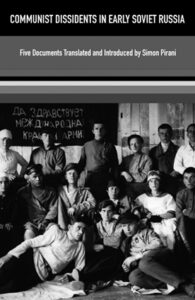
I write to respond to the malicious invention on which John Marot’s review of my book Communist Dissidents in Early Soviet Russia (New Politics, Winter 2024) is centered, and to other inaccuracies.
The malicious invention is that “Pirani makes Lenin’s partisans ultimately responsible for the victory of Stalinism”: this is “a major, perhaps exclusive theme in all his writings.” “Exclusive”?! Most of my written work says little or nothing about the genesis of Stalinism. The book that touches on it, The Russian Revolution in Retreat, offers what I described as “a third interpretation” – as opposed to the “totalitarian” school and left wing structuralists such as Isaac Deutscher – according to which “while some aspects of Bolshevik ideology played a crucial part in weakening and undermining the revolution, that ideology itself was powerfully impacted by social changes over which it had little control, and to whose operation it often blinded itself” (page 236). There follow six pages of discussion.
This passage is in a chapter entitled “Conclusion: the impact on socialism” – an unmistakable expression of my view, in print for more than 15 years. In the book Marot reviewed, I did not discuss my view of the genesis of Stalinism, but referred readers to this earlier work. Instead of engaging with it, Marot invented a fictitious position for me, and lambasted it with angry rhetoric. It’s a disgusting old trick.
Three more points. First: Marot’s mean-spirited dismissal of the communist dissidents whose texts comprise most of the book reviewed. To him, they are “a pocketful of ‘communist dissidents,’ chosen by Pirani,” “Pirani’s handpicked dissidents,” or “Pirani’s chosen dissidents” (twice!). This, to coin E.P. Thompson’s phrase, is the condescension of posterity. Self-evidently these dissidents, rank-and-file Communist party members and ex-members, were a tiny minority; self-evidently, they were out of tune with many workers who greeted the improved living standards achieved by the New Economic Policy. Also self-evidently, in my view, historians of communism who contemptuously deride such minorities – 17th century Diggers and Ranters, the 19th century Luddites to which Thompson referred, or 20th century Russian dissidents – impoverish our understanding.
Second: the group led by Vasilii Paniushkin. Marot claims falsely that I think it “represented the ‘workers’” on the Moscow soviet and that all other delegates “presumably represented only themselves, ‘the tops.’” This is a fairy tale. The words in quotation marks are not mine. I think no such thing. (My opinion of the drama on the Moscow soviet, for all it matters, is expressed in The Russian Revolution in Retreat.)
Third: communist suicides. Marot says he does not know of any study of this. I draw attention to the long note in The Russian Revolution in Retreat, page 123, and the four works referred to there.
Thankfully, Communist Dissidents in Early Soviet Russia is available as a PDF, downloadable free on line, as well as the paper edition. I hope readers will check it for themselves.
[See Marot’s rejoinder here.]


Leave a Reply